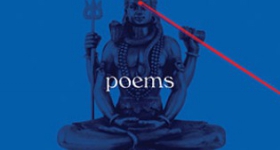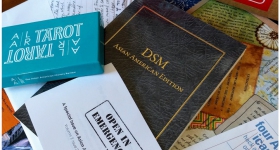Why would anyone pick a
500+ page novel for leisure reading? Die-hard fans of the Amitav Ghosh brand of
story-telling might point to an implicit answer tucked in the last few lines of
his voluminous book: “The picture cost more than I could afford, he said, but I
bought it anyway. I realized that if it were not for those paintings no one
would believe that such a place had ever existed.” Like the painting of Canton
that Neel, one of the main protagonists in Ghosh’s novel, buys to savor his memory
of the place, the sheer visual quality of Ghosh’s narrative saves this
otherwise digressive, rambling, tome.
The second part of
Amitav Ghosh’s Ibis-trilogy, River of Smoke, turns out to be an
expansive canvas containing intricate images of mundane lives in Canton
(Guangzhou), the city of love, lust, and pleasure, around 1938-39, the year the
First Opium War started. The painting memorializes the Fanqui-town (the
settlement of the foreigners) that was destroyed during the Second Opium War
(1956-60). Ghosh weaves the core of the novel around the rivalry between the
British Imperial power and Lin Zexu, the Chinese Commissioner entrusted by the
Emperor with the responsibility of eradicating the smuggling of opium into
China.
The novel narrates the
journey of a Bombay-based, Parsi entrepreneur, Bahram Modi, to Canton in search
of fortune through opium trade and his love for a Chinese boat-woman, Chi-mei.
The city of Canton does not merely serve as a backdrop in the unfolding human
drama but acts a central protagonist that determines the fate of European,
Armenian, and Indian entrepreneurs. Neel, who was a former aristocrat landowner
in Bengal and who was turned into a convict by the British on the charges of
forgery, jumps Ibis, the ship
transporting indentured laborers from India to Mauritius, and eventually
escapes to Canton to take up employment with Bahram Modi.
In the first volume of
the Ibis-trilogy, Sea of Poppies, which terminated at
the Bay of Bengal, Ghosh narrates several characters’ ordinary, impoverished
lives changing irrevocably under the impact of British colonialism in India.
While the first part ended with the indentured Indian laborers on board Ibis entering the Bay of Bengal, the
second part begins with festivities in a make-shift temple atop a mountain in
Mauritius. Young and adult alike ask survivor Deeti to recount how men managed
to evade the British guards and take to the sea on a boat. This supernatural
moment of escape acts as a pivot for Ghosh’s realistic narrative to unfold.

Amitav Ghosh
The motif of travel across
historical space and time -- the hallmark of Ghosh’s writing -- is rehearsed
here, too. The novel narrates the story of three ships -- Ibis, Anahita, and Redruth -- and a body of landmasses --
Great Nicober, Canton, Singapore, and Port Louis in Mauritius. In the process, Ghosh
manages to present a grand history of the evolution of these geographical
spaces. Take for example, his description of Singapore’s emergence as a major
trading port at the expense of Malacca, which had witnessed a cosmopolitan
engagement between different races, languages, and religions. The intervention
of the British seems to destabilize an older fluid notion of culture as new
rigid boundaries are put in place:
[Bahram]
began to understand why several businessmen of his acquaintance had recently
bought and rented godowns and daftars in Singapore: it seems very likely that
the new settlement would soon overtake Malacca in commercial importance. This
evoked mixed emotions in Bahram: he has a suspicion that this British-built
settlement would not be an easy-going place like the Malacca of old, where Malays,
Chinese, Gujaratis and Arabs had lived elbow to elbow with the descendants of
the old Portuguese and Dutch families: Singapore had been so designed as to set
the ‘white town’ carefully apart from the rest of the settlement, with the
Chinese, Malays and Indians each being assigned their own neighborhoods -- or
‘ghettoes’ as some people called them.
The River of Smoke, like Ghosh’s earlier
works, e.g. In An Antique Land,
traces a pre-/early colonial world where cultures and civilizations seemed to
have interacted more fluidly engendering a cosmopolitan environment. While the
validity of such cosmopolitan claims could be challenged, it’s fascinating to
read the process of exchange and entanglement between human beings before the
advent of capitalist modernity that erected boundaries between cultures and
civilizations. Ghosh’s narrative charts how dialogues between civilizations
rupture once the western notion of Free Trade and profiteering is allowed a
free reign without any regard for morality.
Apart from exploring
the process of exchange between human beings, River of Smoke narrates the emergence of an incipient global
ecological consciousness. Fitcher Penrose-owned Redruth’s voyage around the world in search of rare plants that
could adapt and grow in England marks the inauguration of a new way of being
global. The botanical explorations also bring to focus the sharp rivalry
between the European imperial powers launching expensive undertakings in search
of rare plants in places like China that had closed off much of its gardens
from harvesting by the Europeans. Along with imperialists, there were botanical
entrepreneurs like Penrose who scoured the earth for exotic plant varieties.
Ghosh’s ambitious novel
is a capaciously drawn anthropologist’s account. The spacious description
serves to create what Roland Barthes had termed a “reality effect,” an illusion
of reality of life in an era that can best be recreated through fictional
reconstruction. There are numerous moments in the narrative -- e.g., the
description of the smuggled dresses in the ‘Wordy Market’ -- that can flag the
reader’s interest. However, the innumerable digressions do not help in
capturing the unwavering attention of the reader. Yet, at the center of Ghosh’s
narrative is a very simple human drama -- the fulfillment of Bahram Modi’s
financial success and romantic liaison with Chi-mei, and his eventual downfall.
While the history of the Opium Wars has been written and will be undertaken in
future, the novel succeeds in depicting the unremarkable lives of people like
Bahram caught in the vortex of historical events. It is Ghosh’s unerring human
empathy that makes the novel a worthwhile read.
Mosarrap Hossain Khan is a doctoral candidate
in the Department of English, New York University. He researches in the area of
Muslim everyday life in the Indian sub-continent.









Comments